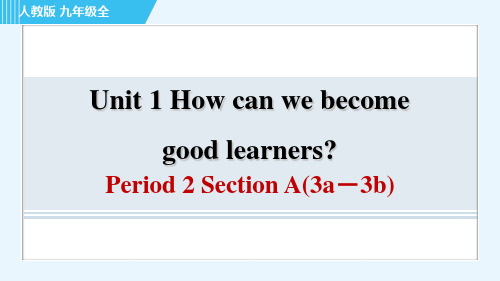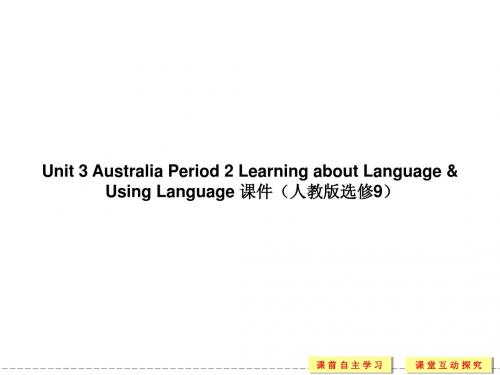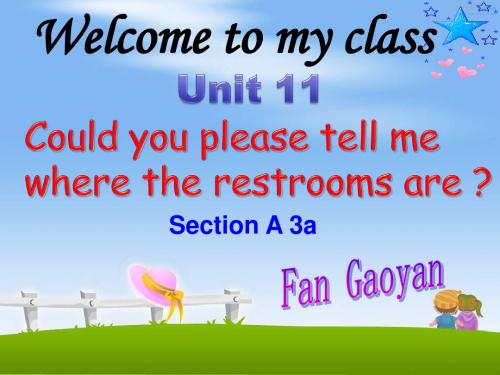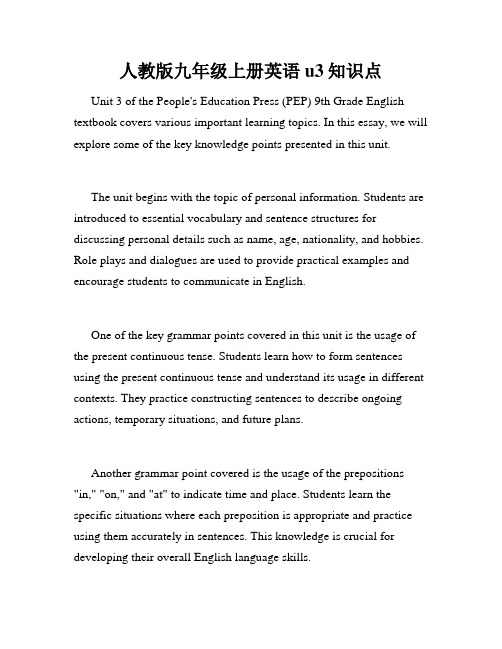人教版九年级英语上册Unit3period2
人教版九年级英语上册Period 2 Section A(3a-3b)

综合创新·提升练
In one of Marx's books, he gave people who were
learning a foreign language some ____D____10 on how to learn it
综合创新·提升练
His mother tongue (母语) was German and at school he ___D_____ 3 French and English, but he felt his English was poor. 3. A. found B. taught C. listened D. learned 【提示】根据句意“他的母语是德语,他又在学校学习 了法语和英语”可知空格处填learned最合适,故选D。
综合创新·提升练
At the same time, his close friend, Engels, often wrote to ____A____ 9 him for his hard work in learning English. 9. A. praise B. ask C. help D. call
综合创新·提升练
四、完形填空 【2021·鄂州改编】 Karl Marx was born in Germany on May 5th,
1818. ____A____1 he was a child, he was forced to leave his country again and again. 1. A. When B. Before C. After D. While 【提示】根据 “he was a child, he was forced to leave his country again and again”可知,他在小时候不断被迫离 开自己的国家,用when引导时间状语从句,故选A。
英语九年级上册人教版u3知识点

英语九年级上册人教版u3知识点Unit 3: English in My LifeIntroduction:English is an essential language in today's world. It is widely spoken and is considered a bridge between different cultures and countries. As a language learner, understanding the key concepts in the ninth-grade English curriculum is vital. In this article, we will explore the key knowledge points of Unit 3 in the People's Education Edition for ninth-grade English.1) Vocabulary:Vocabulary acquisition plays a crucial role in language learning. Unit 3 focuses on expanding students' vocabulary related to travel and transportation. It introduces words and phrases such as "tourist," "destination," "sightseeing," "public transportation," and "traffic congestion." By understanding and using these words correctly, students can effectively communicate about their travel experiences, plans, and transportation preferences.2) Reading Comprehension:The reading comprehension section in Unit 3 revolves around the topic of commuting. Students will engage with various texts that highlight the significance of efficient transportation systems. These texts aim to develop students' ability to comprehend written passages, identify main ideas, and make inferences. Additionally, students will learn specific reading strategies such as skimming and scanning.3) Grammar:Grammar is the backbone of any language. Unit 3 focuses on the use of the simple present tense, present continuous tense, and present perfect tense. By mastering these verb tenses, students can accurately express actions happening at the moment, habitual actions, and experiences. The unit also introduces modal verbs like "can," "could," "may," and "might," enabling students to express abilities, requests, and possibilities effectively.4) Writing:Unit 3 emphasizes developing students' writing skills by focusing on descriptive and narrative writing. Students will learn how to vividly describe locations, events, and people using appropriate vocabularies and sentence structures. Furthermore, they will be encouraged to incorporate dialogues into their narratives, enhancing the authenticity and dynamics of their compositions.5) Listening and Speaking:The listening and speaking section in Unit 3 is designed to improve students' ability to comprehend spoken English and communicate fluently. Through listening exercises, students will develop their ability to understand English in various contexts such as public announcements, conversations, and interviews. The speaking section will hone their skills in expressing opinions, making suggestions, and describing processes.Conclusion:Mastering the key knowledge points in Unit 3 of the ninth-grade English curriculum is crucial for students' overall language development. By expanding vocabulary, improving reading comprehension, understanding grammar concepts, enhancing writing skills, and honing listening and speaking abilities, students will be better equipped to navigate the English language and confidently communicate in various scenarios. English is not just a subject to be studied in classrooms; it is a vital tool that opens doors to endless opportunities in the globalized world we live in.。
最新人教版九年级全一册英语Unit 3 Period 2预习案 (课本P19~P20)

2.——你知道我们在哪儿可以 —Do you know where we can
很快地买到好吃的食物吗? get some good food quickly?
——当然!
—Of course!
3.让我们问一下乐队什么时候 Let’s ask what time the band
D.will tell;will ask
返回
英语
课文理解
Alice and He Wei were in Space World.Alice wondered where
to go 1. next .He Wei suggested 2. going on the new
ride,but Alice thought it was scary.He Wei told Alice if she
返回
英语
3.我在上学的路上遇到我的一个朋友。 I met a friend of mine on my way to school. 4.门口有人。 There is somebody at the door . 5.我那时很忙。 I was busy at that time .
返回
英语
思考探究
返回
英语
二、教材重难点解析。 1.Alice and He Wei pass by Uncle Bob’s. 艾丽斯和何伟经过 鲍勃叔叔的小店。 Uncle Bob’s意为“鲍勃叔叔的小店”。店铺、某人的家或工作 场所等,可用名词所有格表示,所修饰的名词常常省去。如: (1) at the barber’s 在理发店 (理发师:barber) (2) at Mr. Green’s 在格林先生的家
人教版九年级上册英语unit 2 单元词句梳理

Unit 2 I think that mooncakes are delicious!Period 1 Section A(1a-2d)必背单词1. stranger n. 陌生人→ strange adj.奇怪的→strangely adv. 奇怪地2. relative n. 亲属;亲戚→relatives(pl.)3. pound n. 磅(重量单位)→ weigh five pounds 称重5磅4. mooncake n. 月饼5. lantern n. 灯笼必背短语6. put on 增加(体重);发胖;穿上7. be similar to与……相似= take after8. throw... at...把……抛向/泼向/洒向……9. wash away冲掉;冲走必背句子10.Bill wonders whether they’ll have zongzi again next year.比尔想知道明年他们是否还会吃粽子。
11. I wonder if it’s similar to the Water Festival of the Dai peoplein Yunnan Province.我想知道它是否和云南省傣族人的泼水节相似。
Period 2 Section A(3a-3c)必背单词1. steal v. 偷;窃取→stole,stolen(过去式及过去分词)2. lay v.放置;安放;产(卵);下(蛋)→laid,laid (过去式及过去分词)→lay an egg 下蛋→lay out 摆开;布置3. dessert n.(饭后)甜点;甜食4. garden n. 花园;园子→gardener n. 园丁5. admire v. 欣赏;仰慕→look up to sb. 仰慕某人6. folk adj.民间的;民俗的7. goddess n.女神8. whoever pron.无论谁;不管什么人9. tradition n.传统必背短语10. in the shape of...呈……的形状11. shoot down射下12. fly up to...飞到……13. call out 叫喊;大声说出14. as a result结果必背句子15. Chinese people have been celebrating the MidAutumn Festival andenjoying mooncakes for centuries.中国人庆祝中秋节吃月饼已经好几个世纪了。
九年级Unit3-Could-you-please-tell-me-where-the-restrooms-are-Period2

4. Let’s ask what time the band starts playing.
技能目标
1.能够给他人指路或提供帮助
2.学会描述活动感受
情感态度
Read 3a quickly and answer the questions
(1)What is this article about?
(2)How many places are mentioned in this article?
2.Scanning
Task 1 read 3a and answer the questions
观察与思考:
I suggest Water City Restaurant in Water World.
Suggest的意思是,后跟名词,动名词作宾语;也可跟that引导的宾语从句,that从句用should +动词原形。Should可以省略。
3.Readingand retelling
(1)Read after the tape and pay attention to your own pronunciation.
(start) playing Alice and He Wei
(walk) up to a staff person at the door. They want to know when the band starts at eight o’clock. So they should come a little earlier to get there.
九年级英语第三单元Section A period 2

Unit 3 Teenagers should be allowed
to choose their own clothes. Period 2
Revision
根据中文完成句子。 1. 应该允许青少年选择自己的服装。 Teenagers ______ ___ ______ to choose should be allowed their own clothes.
4 GROUPWORK Talk to other students in the class and find three people who have to follow these rules. Write their names in the chart.
Find someone who… has to go home after school is allowed to stay up until 11:00 pm
2. So do we. 我们家也是(有)。 1) 用副词 too 多用于口语,句末, 肯定句/ 问句. either多用于口语,句末, 否定句 表 “……也一样”, also 多用正式 文体,句中近动词, 各句型。 2) 用倒装 陈述部分肯定用 “so+谓动 + 主语” 陈述部分否定用 “nor/neither+谓动+ 主语”。
2. 安娜想穿耳洞。 Anna wants to get her ____ pierced ___ ___ ears ______.
3.我认为不应该允许16岁的孩子开车.
sixteen-year-olds I think ________________ shouldn’t be allowed to drive.
九年级英语全册UnitPeriod2SectionA3a_3b新版人教新目标版

— ______. I’m very good at drawing.
A. It takes time
B. It serves you right
C. It’s a piece of cake D. It’s up to you
【点拨】根据 “I’m very good at drawing.”可知画画对 Mike 来说很容易。It’s a piece of cake. 表示事情很简 单且容易做。故选C。
返回
Push yourself outside of your comfort zone (舒适区) and start speaking English today. You’ll be surprised at how quickly your language 18 improve. ( C ) 18. A. habits B. plans C. skills D. ideas 【点拨】language skills 语言技能,符合语境,故选C。
【点拨】grammar rules 意为“语法规则”。
返回
9. This term, I made a new friend ___c_a_l_le_d___ James Green. 【点拨】a new friend called James Green 意为“一个叫 James Green 的新朋友”,过去分词作定语。
返回
四、完形填空[2023 滁州五中月考] Learning English can be difficult, but don’t give up!
With 16 practice and the right ways, you can start speaking English. ( C ) 16. A. clear B. heavy C. enough D. small
高中英语配套课件:选修9 Unit 3 Period 2(人教版)

10.________________只有,仅仅
课前自主学习 课堂互动探究
答案
1.与„„通信
2.把„„归功于;欠
3.说服某人做某事
4.„„的家园
effect on
5.不时地;偶尔;有时
6.far from
7.have an
8.only if
9.be capable of doing sth
large country? 2.This crocodile moves very quickly when it sees something it ________ ________ ________( 认 为 是 )food , and________ ________ ________ ________(时常)a crocodile has snatched
课前自主学习
课堂互动探究
6.____________n.毒液;恶意;怨恨→____________adj. 7 . ____________adj. 麻痹的;瘫痪的 → ____________n .麻痹; 瘫痪
8.funnel/'fʌnl/n.____________
9.____________adj.不省人事的,未发觉的(反义词)→ ____________ 10.wind/wInd/vt.____________ 答案 1.sow;sowed;sown 2.correspond;correspondence
课前自主学习
课堂互动探究
Ⅳ.根据课文内容判断正(T)误(F) 1.Of all the animals mentioned in the passage,not all of them are dangerous to human beings. place to live in or visit. ( ( ) )
人教版2020九年级英语上册 Unit 3 Teenage problems Period 2 Reading分层训练 (新版)牛津版

Unit 3 Teenage problemsPeriod 2 Reading第2课时分层训练[Period 2-Ⅰ]Ⅰ.根据句意及汉语提示完成句子1.Some teenagers don't know how to ________(处理) with their personal problems.2.I had no choice ________(只有) to sign the contract.3. 2017·百色I ________(几乎不) heard what you said. Can you say it again?4.You can write to him if you ________(怀疑) my words.5.2017·烟台Can you ________(想象) what the future will be like?Ⅱ.用括号内所给单词的适当形式填空1.It's a wise ________(choose) to wear the white tie. It matches your shirt well.2.The TV programme is so fantastic that it is well worth ________(watch).3.This reduces the time you are ________(wake) in bed.4.This is one of the most ________(value) lessons I have learned.5.2016·荆州Mr Green advises us to keep a diary. His ________(suggest) is good for our writing.Ⅲ.根据汉语意思完成句子1.培养爱好是重要的,因为它们能帮助人们放松。
人教版初中英语九年级上册period2-课件

throw water at each other 朝彼此泼水
子天
是开
梅放
花;
,有
选的
择孩
在子
冬是
天荷
开花
放,
选
择
在
夏
我们,还在路上……
— Differences? Oh, no. They look quite
__B____.
A. different
B. similar
C. strange
D. interesting
(2013山东烟台) 五、词语运用 A.根据句意和所给的中文提示,写出句子 中的单词。 The customs in Qingdao are __s_im__il_a_r___ (相似的)to those in Yantai.
weeks.
A. is
B. was
C. has been
D. will be
【解析】句义为“这学期即将结束,暑假 在两星期之后就要到来。” ,故选择D。
知识拓展
“in+一段时间”和过去式连用,表示“ 在某段时间内” I finished my homework in 2 hours.
我两小时内做完了功课。
My problems are very similar to yours. 我的问题与你的差不多。
His dress is very similar to mine in colour. 他衣服的颜色和我衣服的很相似。
新版九年级Unit3_period2公开

其用法如下:(l) suggest sth.意为“建议/提议某事”。
► He suggested a two-day-long stay in Beijing.
(2) suggest doing sth. 意为“建议/提议做 某事” ►My father suggested _______ calling (call) for a doctor at once. (3)suggest +宾语从句。意为:表明 The expression on your face suggests that you are very excited.
Language Points
1. If you’re afraid, just shout or hold my hand. shout 作动词,意为“呼喊; 呼叫;大声说” 常用短语: (l) shout at sb. 意为“冲某人大声叫嚷”含有 批评、指责的意思。 别对你父母大声叫嚷。 Don t shout at your parents. (2) shout to sb.意为“对某人大声叫喊”, 没有批评、指责的意思 他冲那个女孩大喊,警告她有危险。 He shouted to the girl and warned her of the danger. (3) shout out意为“喊出; 突然呼喊”。Shout oud the article and underline the objective clauses. I wonder where we should go next. Do you know where we can get some good food quickly? • Excuse me, could you tell us when the band starts playing this evening?
人教版英语九年级课件Period2

inChina!”KangJianthinksit’sgreatthatChinais sogoodatmakingtheseeverydaythings.Howeve r,hewishesthatinthefutureChinawillalsogetbet teratmakinghightechnologyproductsthatpeoplecanbuyinallpar tsoftheworld.
In2006,ChinaovertookJapanasthesecondlargestproducerofcarsandtrucksaftertheUnited States.Outoftheworld'sfivebusiestportsinthewor ld,threeareinChina.
Weshouldmovefrom“MadeinChina”to“Created inChina”,from“Chinaspeed”to“Chinaquality”a ndfrom“Chineseproducts”to“Chinesebrands”.
Readthepassageagainandwritewhattheu nderlinedwordsreferto.
1. Nomatterwhatyoumaybuy,youmightproba blythinkthoseproductsweremadeinthoseco untries.
those:___A_t_o_y_c_a_r_a_n_d_a_p_a_i_ro_f_b_a_s_k_e_t_b_a_ll_s_hoes those:___t_a_st_e_f_in_e_f_o_o_d________________
3b Readthepassageandanswerthequestions.
人教版九年级英语上册导学案Unit2,3

第五步:当堂检测案(包含“考点链接” 应用探究 5 分钟) Ⅰ. 根据句意选出恰当的一项填空。
1. _______ (What / What a) delicious chicken we are having! 2. _______ (What / How) warm it is in the classroom! 3. _______ (What / What a) nice shirt you bought! 4. _______ (What / How) fast the young man is walking! Ⅱ. 把下列句子改为宾语从句的复合句。 1. He said, “I have been to America”. He said _____ _____ _____ _____ to America. 2. Is there a hotel near here? Do you know? Do you know _________ _____ ____ a hotel near here? 3. What sport do you like best? Could you please tell me? Could you please tell me _____ _______ ____ _____ ____? 4.“The earth moves around the sun”, our English teacher told us. Our English teacher told us that the earth ______ _______ the sun.
教学流程
明确学习 目标重难
点
学法 指导
第一步:课前预习案(启发探究 4 分钟)
预习书本 12 页的相关内容,完成下列两个任务。 1. 翻译下列短语。 母亲节_____________ 父亲节____________ two special days more and more popular______________ give gifts to parents____________ show our love___________ help parents to do something on the second Sunday of May _________________________ 在六月的第三个星期日_________________________________
最新人教版九年级全一册英语Unit 3 Period 2训练案 (课本P19~P20)

英语
One day, he went with his mother to the farm.The sun shone.The flowers were 18 to come out.A smile was on Ralph’s face.Ralph helped his mother with the farm 19 and he was very happy.“Now you must be tired and 20 ,” said his mother.“Have 21 good rest here and eat some cookies.I will get a beautiful red flower for you.” So his mother brought the red flower to him.When he saw his mother also had a white rose in 22 hand, he asked for it.“No, my dear,” said his mother.“See how many thorns it has.
谢谢观看
( B )5.My teacher told me that light
faster .travels
C.traveled D.traveling
英语
二、根据句意,用所给单词的适当形式填空。 6.If you are scared (scary), just shout or hold my hand. 7.Tom suggests taking (take) his mother to go out for dinner. 8.This restaurant looks interesting (interest). 9.Why don’t you mail (mail) a thank⁃you letter to her? 10.Please come a little earlier (early) to get a table.
人教版九年级上册英语u3知识点

人教版九年级上册英语u3知识点Unit 3 of the People's Education Press (PEP) 9th Grade English textbook covers various important learning topics. In this essay, we will explore some of the key knowledge points presented in this unit.The unit begins with the topic of personal information. Students are introduced to essential vocabulary and sentence structures for discussing personal details such as name, age, nationality, and hobbies. Role plays and dialogues are used to provide practical examples and encourage students to communicate in English.One of the key grammar points covered in this unit is the usage of the present continuous tense. Students learn how to form sentences using the present continuous tense and understand its usage in different contexts. They practice constructing sentences to describe ongoing actions, temporary situations, and future plans.Another grammar point covered is the usage of the prepositions "in," "on," and "at" to indicate time and place. Students learn the specific situations where each preposition is appropriate and practice using them accurately in sentences. This knowledge is crucial for developing their overall English language skills.The unit also introduces the topic of adverbs of frequency. Students learn how to use words like "always," "often," "sometimes," "never," and "rarely" to describe the frequency of different actions or events. They practice constructing sentences to express how often they perform certain activities or encounter specific situations in their daily lives.In addition to grammar, vocabulary acquisition is an important focus in this unit. Students learn new words related to personal information, daily routines, and hobbies. They are encouraged to use these words in sentences and dialogues to reinforce their understanding and expand their vocabulary.An integral part of language learning is the ability to read and comprehend texts. Unit 3 includes various reading materials, such as articles and passages, that allow students to practice their reading skills. Students learn how to identify main ideas, comprehend details, and infer meanings from the context. This helps them develop their reading comprehension and critical thinking abilities.Listening and speaking skills are also emphasized in this unit. Students engage in activities where they listen to audio clips or their peers' speeches and respond accordingly. By actively participating inthese activities, students improve their listening comprehension and speaking fluency.To reinforce the learned knowledge, Unit 3 provides exercises and practice sessions. Students are given opportunities to apply what they have learned through fill-in-the-blank exercises, role plays, and discussions. These practical activities facilitate the consolidation of their understanding and encourage active engagement in the learning process.In summary, Unit 3 of the PEP 9th Grade English textbook covers a wide range of important knowledge points. From personal information and grammar to vocabulary, reading, and listening skills, students are exposed to various aspects of the English language. Through interactive activities and practice sessions, students can effectively develop their language skills and gain confidence in using English in real-life situations.。
人教版九年级英语上册Unit 3 Unit 3 section A-2 【精品教案设计】

2.What did you do there?
Step 3
ActiviBiblioteka y 3a.Let Ss read a conversation and answer some questions.
Step 4
Activity 3b-1.
B: Sure, just …
Step 1
Discussion.
Show Ss some playing pictures and ask Ss about what do they often do with their friend at the weekend?
Step 2
Free talk.
Read and underline the questions and statements that ask for information.
Step 5
Activity 3b-2.
Let Ss read and underline the questions and statements that give suggestions.
Unit 3 Section A-2
Class Type
Reading
Objectives
1.To learn the funny things about the fun time parks.
2.To pay attention to the way of asking for information.
pass by, pardon me
Period
1
Procedure
Lead-in
- 1、下载文档前请自行甄别文档内容的完整性,平台不提供额外的编辑、内容补充、找答案等附加服务。
- 2、"仅部分预览"的文档,不可在线预览部分如存在完整性等问题,可反馈申请退款(可完整预览的文档不适用该条件!)。
- 3、如文档侵犯您的权益,请联系客服反馈,我们会尽快为您处理(人工客服工作时间:9:00-18:30)。
2d Role-play the conversation.
He Wei: This Fun Timeent park in our city!
Alice: I’m excited to try the rides! He Wei: What should we start with ? There’s Space World, Water World, Animal World ...
Alice: Before we decide, could you first tell me where the restrooms are? He Wei: Pardon? Restroom? You want to rest? But we haven’t even started yet! Alice: Oh no, I don’t mean that. I mean ... you know, a washroom or bathroom. He Wei: Hmm ... so you mean ... the toilets?
•Excuse me. Could/Can you tell me the way to…? •Excuse me. Could/Can you tell me how I can get • to…? •Excuse me. Could/Can you tell me how to get to…? •Excuse me. Could/Can you tell me where…is/are? •Excuse me. Do you know where/how…? •Excuse me. Which is the way to…, please? •Excuse me. Where is …, please? •Excuse me. Is there a/an…near here?
2. Sure, just go along Main Street until you pass Center Street. 当然,就沿着主街向前走,一直到你经过中心大街 。 go along 表示“沿着……向前走” 指路常用语。
Go along this street, and you will find the park in the end. 沿着这条街向前走,在路的尽头你会找到那个公园。
Alice: Yes! Sorry, maybe people in China don’t often use the word “restroom”
when they speak English.
He Wei: That's right. In China, we normally say “toilet” or “washroom” in English. Anyway, they’re over there. Alice: OK. I’ll be quick! He Wei: No problem. You don’t need to rush!
• Turn left/right at… 在……往左/往右转。 • Turn right at the third crossing, and then walk • straight. • 在第三个十字路口往右转,然后朝前直走。 • Take the first/second…turning on the right/left. • 在第一/二……个拐弯处往右、左拐。 • Take the second turning on the right. • 在第二个拐弯处往右拐。
Could you please not stand here?
请别站在这儿好吗?
• Could you please do sth.? • Would/Will you please do sth.? • Would you like to do sth.? • May/Can/Could I do sth.? •肯定回答常用:Sure./Of course./ No problem./ • I’d love to.等。 •否定回答常用:Sorry, I’d love/like to, but I…/ • Sorry, I’m afraid …等。
(2) Could you please…? “请你……好吗?” 否定式为“Could you please not…” “请你 别……好吗”交际用语,表示有礼貌的提出 请求,后接动词原形。
Could you please tell me where the bookstore is?
请你告诉我书店在哪里好吗?
Language points
1.Excuse me, could you please tell me how to get to the bookstore? 2. 打扰一下,你能告诉我怎样到达书店吗? 3.(1) Excuse me. 是英语中常用的的客套用语,其意思根据不同 情境理解为“请问”“请原谅”“不好意思,打扰一下”等。 如: 4. Excuse me, just a minute, please. 5. 对不起,稍等一下。 6. Excuse me, could you tell me how to get to No.1 Middle School? 7. 打扰了,你能告诉我怎样去第一中学吗?
• It’s across from/near/next to …
• 它就在……对面/附近/旁边。
• It’s across from/near/next to the hospital.
• 他就在医院对面/附近/旁边。
• You can take the NO. …bus and get off at…
